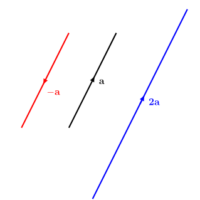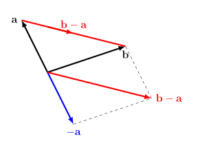Scalar multiplication
Similar to vector addtion, scalar multiplication is relatively intuitive to compute:
$$ k \begin{pmatrix} a_1 \\ a_2 \\ a_3 \end{pmatrix} = \begin{pmatrix} k a_1 \\ k a_2 \\ k a_3 \end{pmatrix} $$
For example, $ 2 \begin{pmatrix} 1 \\ -2 \\ 3 \end{pmatrix} = \begin{pmatrix} 2 \\ -4 \\ 6 \end{pmatrix} $
To visualize the result, we scale/stretch the vector, making it $k$ times as long if $k$ is positive. If $k$ is negative, we also reverse the direction of the vector in addition to scaling it by $|k|$. The following diagram illustrates the relationship between vectors $\mathbf{a}, -\mathbf{a}$ and $2\mathbf{a}$.
Vector subtraction is defined by a combination of vector addition and scalar multiplication. $\mathbf{b}-\mathbf{a} = \mathbf{b} + (-\mathbf{a})$. This is visualized in the diagram below. We will return to this picture in the next section on position vectors.
Parallel vectors
Notice that, from definition, $k \mathbf{a}$ is parallel to $\mathbf{a}$ if $k \neq 0$. This gives us a key result:Solution to examples:
Since $\begin{pmatrix} 1 \\ 2 \\ -3 \end{pmatrix}$ is parallel to $\begin{pmatrix} -3 \\ y \\ z \end{pmatrix}$, $\begin{pmatrix} -3 \\ y \\ z \end{pmatrix}
= k \begin{pmatrix} 1 \\ 2 \\ -3 \end{pmatrix} = \begin{pmatrix} k \\ 2k \\ -3k \end{pmatrix}$ for some $k$.
Hence $-3 = k$, $y = 2(-3)=-6$ and $z = -3(-3)=9$.
$\begin{pmatrix} 4 \\ 8 \\ -12 \end{pmatrix} = 4 \begin{pmatrix} 1 \\ 2 \\ -3 \end{pmatrix}$. Since $\mathbf{b} = 4 \mathbf{a}$, $\mathbf{a}$ is parallel to $\mathbf{b}$.
The presentation/phrasing style for "show/prove" questions are slightly different from the more common solve questions. Try to mimic the style above and consult with your teachers/me about your presentation when you attempt such questions.

